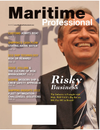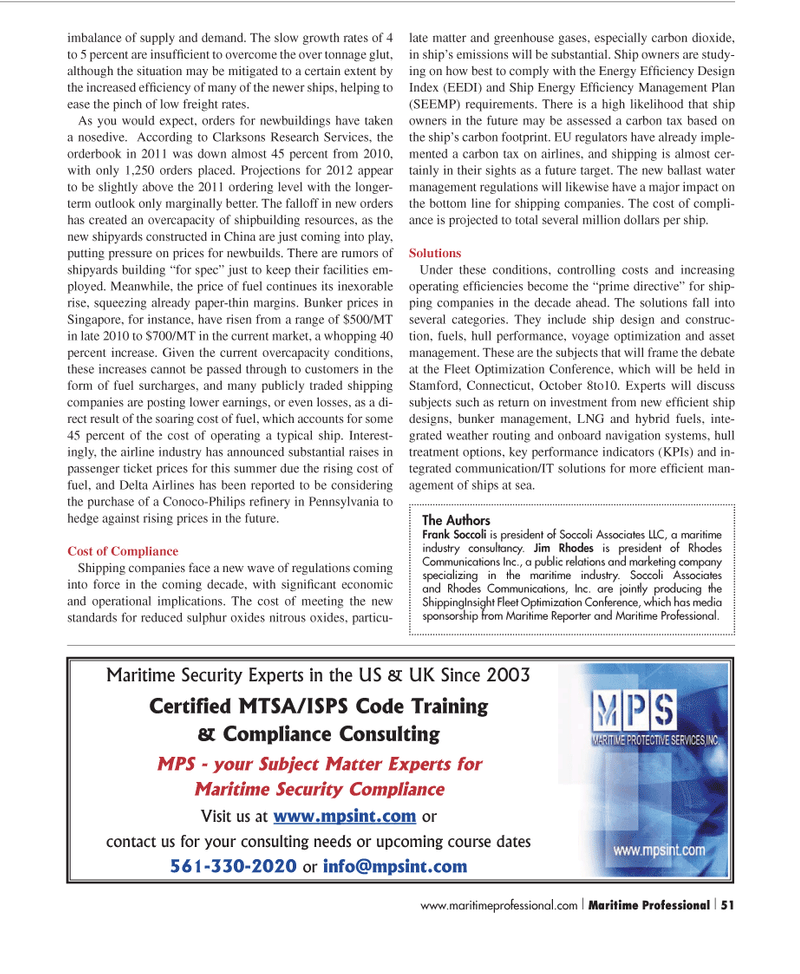
Page 51: of Maritime Logistics Professional Magazine (Q2 2012)
Maritime Risk
Read this page in Pdf, Flash or Html5 edition of Q2 2012 Maritime Logistics Professional Magazine
Maritime Security Experts in the US & UK Since 2003
Certified MTSA/ISPS Code Training & Compliance Consulting
MPS - your Subject Matter Experts for
Maritime Security Compliance
Visit us at www.mpsint.com or contact us for your consulting needs or upcoming course dates 561-330-2020 or [email protected] imbalance of supply and demand. The slow growth rates of 4 to 5 percent are insuffi cient to overcome the over tonnage glut, although the situation may be mitigated to a certain extent by the increased effi ciency of many of the newer ships, helping to ease the pinch of low freight rates.
As you would expect, orders for newbuildings have taken a nosedive. According to Clarksons Research Services, the orderbook in 2011 was down almost 45 percent from 2010, with only 1,250 orders placed. Projections for 2012 appear to be slightly above the 2011 ordering level with the longer- term outlook only marginally better. The falloff in new orders has created an overcapacity of shipbuilding resources, as the new shipyards constructed in China are just coming into play, putting pressure on prices for newbuilds. There are rumors of shipyards building “for spec” just to keep their facilities em- ployed. Meanwhile, the price of fuel continues its inexorable rise, squeezing already paper-thin margins. Bunker prices in
Singapore, for instance, have risen from a range of $500/MT in late 2010 to $700/MT in the current market, a whopping 40 percent increase. Given the current overcapacity conditions, these increases cannot be passed through to customers in the form of fuel surcharges, and many publicly traded shipping companies are posting lower earnings, or even losses, as a di- rect result of the soaring cost of fuel, which accounts for some 45 percent of the cost of operating a typical ship. Interest- ingly, the airline industry has announced substantial raises in passenger ticket prices for this summer due the rising cost of fuel, and Delta Airlines has been reported to be considering the purchase of a Conoco-Philips refi nery in Pennsylvania to hedge against rising prices in the future.
Cost of Compliance
Shipping companies face a new wave of regulations coming into force in the coming decade, with signifi cant economic and operational implications. The cost of meeting the new standards for reduced sulphur oxides nitrous oxides, particu- late matter and greenhouse gases, especially carbon dioxide, in ship’s emissions will be substantial. Ship owners are study- ing on how best to comply with the Energy Effi ciency Design
Index (EEDI) and Ship Energy Effi ciency Management Plan (SEEMP) requirements. There is a high likelihood that ship owners in the future may be assessed a carbon tax based on the ship’s carbon footprint. EU regulators have already imple- mented a carbon tax on airlines, and shipping is almost cer- tainly in their sights as a future target. The new ballast water management regulations will likewise have a major impact on the bottom line for shipping companies. The cost of compli- ance is projected to total several million dollars per ship.
Solutions
Under these conditions, controlling costs and increasing operating effi ciencies become the “prime directive” for ship- ping companies in the decade ahead. The solutions fall into several categories. They include ship design and construc- tion, fuels, hull performance, voyage optimization and asset management. These are the subjects that will frame the debate at the Fleet Optimization Conference, which will be held in
Stamford, Connecticut, October 8to10. Experts will discuss subjects such as return on investment from new effi cient ship designs, bunker management, LNG and hybrid fuels, inte- grated weather routing and onboard navigation systems, hull treatment options, key performance indicators (KPIs) and in- tegrated communication/IT solutions for more effi cient man- agement of ships at sea.
The Authors
Frank Soccoli is president of Soccoli Associates LLC, a maritime industry consultancy. Jim Rhodes is president of Rhodes
Communications Inc., a public relations and marketing company specializing in the maritime industry. Soccoli Associates and Rhodes Communications, Inc. are jointly producing the
ShippingInsight Fleet Optimization Conference, which has media sponsorship from Maritime Reporter and Maritime Professional. www.maritimeprofessional.com | Maritime Professional | 51
MP #2 50-64 NEW STYLES.indd 51 5/4/2012 6:27:31 PM

 50
50

 52
52
